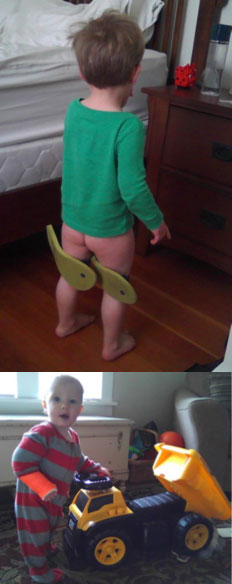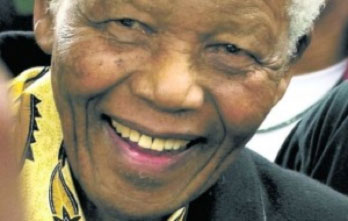I’ve been thinking about empathy, sympathy, and Flip Flops.
June 17, 2013 | In: I've Been Thinking
 Recently, my grandson George borrowed the Haviannas I schlepped home from Sao Paulo for my daughter. He put them on all by himself. We think we may have a fashionista on our hands—a theory further supported a week later when he requested the doctor use fluorescent pink fiberglass to make a cast for his little brother Isaac’s broken arm.
Recently, my grandson George borrowed the Haviannas I schlepped home from Sao Paulo for my daughter. He put them on all by himself. We think we may have a fashionista on our hands—a theory further supported a week later when he requested the doctor use fluorescent pink fiberglass to make a cast for his little brother Isaac’s broken arm.
In a previous life when I was a minister, a nine-year-old in my church turned in a prayer request: “Dear Pastor Mark, I broke my arm and it’s a pain in the neck. Your friend, Jason”
None of us makes it to the finish line without his or her share of pains in the neck, at which times I am tempted to dwell on my sorrows and dismiss others’. An old preacher-poet mentor, Gerhard Frost, said it better: “Threatening things seem so tame when faced by someone else.”
The late African American novelist James concurred with a twist: “You think your pain and your heartbreak are unprecedented in the history of the world, but then you read.”
During a PBS interview with Bill Moyers, Barbara Kingsolver (The Poisonwood Bible) observed, “When you pick up a novel from the bedside table, you put down your own life at the same time, and you become another person for the duration. And so you live that person’s life, and you understand what it’s like to live a life that’s completely different from yours. And when you put that book down, you’re changed. You have something more expansive in your heart than you began with,” which she later labels empathy.
This week we are picking up the news of what appears to be Nelson Mandela’s final days on earth. South Africans are in prayer vigils for the beloved father of their democracy. They gratefully recall the antiapartheid icon’s voluntary and involuntary agony on their behalf over his nearly 95 years. I’m realizing afresh how little I have suffered and how much empathy and sympathy Mandela has demonstrated toward those who have.
When I first met the word empathy as a teenager, I had difficulty telling it apart from its unidentical twin, sympathy. This afternoon I stumbled onto diffen.com, where one can “compare anything” simply by filling in two windows (which are separated by vs.) then clicking compare. The results were helpful:
| Sympathy Acknowledging another person’s emotional hardships and providing comfort and assurance (emphasis mine) |
vs. |
Empathy Understanding what others are feeling because you have experienced it yourself or can put yourself in their Flip Flops (Okay, it said shoes) |
Having walked my own green mile to an MRI for my shoulder, I feel for anyone headed to the torture chamber. Since losing a mother, brother, 95-year-old mentor, and daughter, I’m griped with deeper understanding when I hear of someone else losing theirs.
Of course, we needn’t wait until we’ve experienced the same tragedies to empathize with others. Not if we make the effort to walk a few blocks in their shoes or take a moment to visualize life through their eyes.
Last month, I received a link to Empathy, a 4.5-minute video from the Cleveland Clinic, which has helped me see people differently for the last four-and-a-half weeks. I’ll bet you $4.50 that you’ll click like and share after you watch it.
The video was designed primarily to help employees see through the eyes of patients and their loved ones moving through the clinic. But it also helps them see through the eyes of fellow nurses, physicians, housekeepers, engineers, and everyone else in the building. The concept extends just as well to the barista at Starbucks on the way home, the neighbor mowing his lawn next door, and the teenager raiding the fridge. Each person we encounter is experiencing a pain or two in the neck.
However, at risk of stating the obvious, mere understanding is of little value to others. Beyond empathy, sympathy acknowledges and provides. It gets me off the couch and over to my desk to write a note or into my car to drive across town to deliver a hug. It draws me out of myself long enough to hold a door open, thank a flight attendant, leave a bigger tip, engage in a conversation I “really don’t have time for,” or to look a passerby in the eye and share a simple smile.
 It is difficult to find a picture of Nelson Mandela among Google images in which he is not smiling—especially those taken after an unjust 27-year jail term during which he contracted tuberculosis. Unencumbered by bitter self-centeredness, the liberator’s smile seems to offer a cup of cold water to a dry-and-weary world drawn from a deep-sweet well of empathy, which Kingsolver during the Moyer interview described as understanding “that someone else’s pain is as meaningful as your own.”
It is difficult to find a picture of Nelson Mandela among Google images in which he is not smiling—especially those taken after an unjust 27-year jail term during which he contracted tuberculosis. Unencumbered by bitter self-centeredness, the liberator’s smile seems to offer a cup of cold water to a dry-and-weary world drawn from a deep-sweet well of empathy, which Kingsolver during the Moyer interview described as understanding “that someone else’s pain is as meaningful as your own.”
Little wonder that one of Mandela’s most quoted words of advice is “Appearances matter—and remember to smile.” Hmm. I too would like to be found guilty of practicing what I preach.
What do you think?
![]()
Mark Neuenschwander a.k.a. Noosh
BTW, I’m pretty sure empathy encompasses sensing others’ delight as well as their distress and that sympathy involves rejoicing with those who rejoice as well as weeping with those who weep. So, I’m laughing my sides off with George—acknowledging his inventive genius while relishing how the little guy got a wacky gene or two from his gramps. However, don’t hold your breath waiting on Pinterest for pix of me walking a mile in my grandson’s version of Flip Flops. Empathy has its limits.
